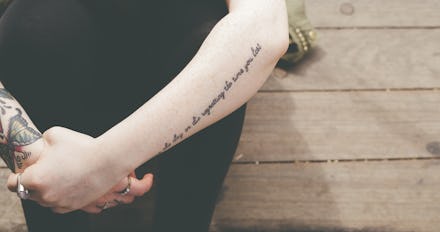Here's How an Anxiety Disorder Is Different From Everyday Anxiety

Everyone feels anxious once in a while — maybe you've got a big presentation tomorrow, or you're about to tell someone you like them. But sometimes anxiety crosses the threshold from common to unmanageable. Here's the difference between everyday anxiety and an anxiety disorder, and what you can do about both.
Read more: Jennifer Lawrence Has Some Pretty Stellar Advice for People Dealing With Anxiety
According to the Anxiety and Depression Association of America, people with generalized anxiety disorder experience "persistent, excessive and unrealistic worry about everyday things" that's hard to control.
While "anxiety is a normal reaction to stressful and uncertain situations," according to the ADAA, when anxiety interferes with daily tasks, it may be more serious than average anxiety.
"GAD is not triggered by a specific situation," according to the ADAA. "People with generalized anxiety disorder experience persistent, excessive and unrealistic worry about issues like money, health, family or work for six months or longer."
According to the National Institute of Mental Health, "Occasional anxiety is a normal part of life. ... But anxiety disorders involve more than temporary worry or fear. For a person with an anxiety disorder, the anxiety does not go away and can get worse over time. The feelings can interfere with daily activities such as job performance, school work and relationships."
According to the ADAA, symptoms of generalized anxiety disorder include "restlessness or feeling keyed up or on edge," "being easily fatigued," "difficulty concentrating or mind going blank," "irritability," "muscle tension" and "sleep disturbance," such as not being able to fall asleep or stay asleep. The ADAA reported GAD "affects 6.8 million adults, or 3.1% of the U.S. population, in any given year, and women are twice as likely to be affected."
There are lots of strategies that can help manage everyday anxiety, like yoga or spending time outside, but people with anxiety disorders may also turn to additional forms of support, like cognitive-behavioral therapy, support groups or medication prescribed by a doctor. "Anxiety disorders are generally treated with psychotherapy, medication or both," according to the NIMH.
Before you diagnose yourself with GAD or another anxiety disorder over the internet though, speak to a health professional. According to the NIMH, "A thorough mental health evaluation is also helpful, because anxiety disorders often coexist with other related conditions, such as depression or obsessive-compulsive disorder."